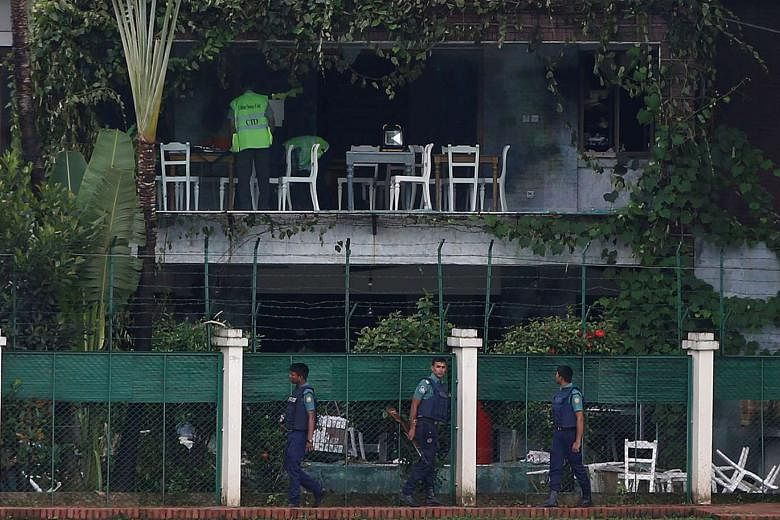NEW DELHI ( NYTIMES) - An Islamic State in Iraq and Syria (ISIS) publication offered a detailed account of the bloody July 1 siege of a restaurant in Dhaka, the capital of Bangladesh, including the use of religious tests to distinguish Muslims from non-Muslims, who would then be killed.
The article, which appeared this week and also threatened further attacks in the country, bears the byline of Tamim Ahmed Chowdhury, a militant who was killed with two associates in a police raid in late August.
Chowdhury, a Canadian citizen, had been identified by some analysts as the coordinator of ISIS' activities in South Asia, but had never been named by the group.
It is unusual for ISIS to publish the real names of its fighters, said Mr Amarnath Amarasingam, a fellow at George Washington University's Programme on Extremism.
Mr Amarasingam said ISIS has been eager to "take ownership" of the Dhaka attack, which came at a time of military setbacks in its core territory in the Middle East.
Since Chowdhury's death, there has been a lull in the small-scale attacks on foreigners, secular Bangladeshis and members of religious minorities that had occurred at regular intervals in recent years.
The July attack, on the Holey Artisan Bakery, in which 22 people were killed, was the most complex and large-scale operation to date by Islamic militants in Bangladesh's recent history. Among the dead were numerous foreigners working in Bangladesh's garment sector or for aid organizations.
In the aftermath of the attack, Bangladesh officials were under pressure to acknowledge that transnational terrorist organisations like ISIS were trying to build a presence in the country.
The authorities in Dhaka are still investigating the attack and said on Wednesday (Oct 5) that they were analysing the account in Rumiya, ISIS' newest media product.
"It is a long piece, with a lot of information to go through, so I cannot speak clearly now on things like authenticity," said Sanwar Hossain, additional deputy commissioner of the counter-terrorism unit in the Dhaka Metropolitan Police.
He said that the police also knew Chowdhury by the kuniya, or nom de guerre, cited in the magazine.
"We have known for a while that this is how Tamim Chowdhury was referred to," he said.
On Sunday (Oct 2), police granted bail and released Mr Tahmid Hasib Khan, a Bangladeshi man who was one of the hostages in the cafe attack. A second hostage, Hasnat Karim, remains in police custody, though some of the charges against him have been dismissed in court.
Ms Sharmina Parveen Karim, Karim's wife, said she hoped her husband would be released soon.
"We are just waiting," she said. "We can't do anything but wait."
The article published in Rumiyah said the Holey Artisan Bakery had been selected as a target because it was "a sinister place where the Crusaders would gather to drink alcohol and commit vices throughout the night, feeling secure from the wrath of Allah that was awaiting them".
It said the attackers set out to kill only non-Muslims in the restaurant and sorted their prisoners by religion, asking "very basic religious questions whose answers any Muslim youth or elderly would know".
"Those who proved their Islam were treated with respect and mercy," the account says, while those who did not "were treated with harshness and severity".
The account partially tallied with the testimonies of survivors. A Bangladeshi cook who survived said gunmen told him not to worry, because the attackers were killing only foreigners.
Ms Karim, who was dining at the restaurant with her husband and two children, said the attackers had targeted Japanese and Italian customers who were obvious foreigners at first, and later began to ask those who remained whether they were Bangladeshi Muslims.
"They entered and started shooting straight away," she said. "People were screaming, 'Help, help,' and fell to the floor once they were shot. Once they were certain that people were injured, they started to chop their throats, hands."
Ms Karim added that as dawn approached, the attackers debated whether to kill the remaining hostages and decided against it.
The article gives detailed biographies of the five attackers, noting that at least two had unsuccessfully tried to join ISIS forces in Libya, Syria and other battlegrounds outside Bangladesh.
It goes on to threaten further attacks on foreigners in Bangladesh, singling out "expats, tourists, diplomats, garment buyers, missionaries, sports teams and anyone else from the Crusader citizens to be found in Bengal."
Deputy police commissioner Masudur Rahman, a police spokesman, said the police in Bangladesh had killed at least a dozen known militants since the restaurant siege.
"The way we see it, looking at the number of people we've arrested, and then adding that up with the number of people who have been killed in our raids, of course the militants' operation is weaker," he said.

